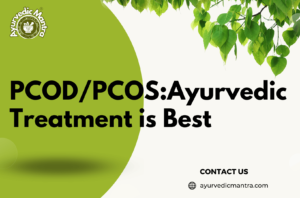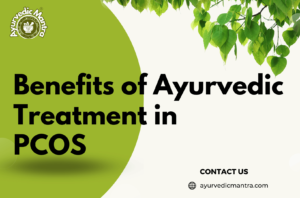
PCOD/PCOS: Ayurvedic Treatment is Best
Introduction Polycystic Ovary Disorder (PCOD) or Polycystic Ovary Syndrome (PCOS) is a common endocrine disorder affecting millions of women worldwide. It leads to hormonal imbalances,

Are you grappling with the challenges of Polycystic Ovary Syndrome (PCOS)? If so, you’re not alone. PCOS affects countless women worldwide, leading to hormonal imbalances that can result in various health issues. One key approach to managing PCOS effectively is through a well-thought-out diet. In this comprehensive guide, we’ll delve into the intricacies of a PCOS diet, offering insights into what to eat and how it can positively impact your health.
Incorporating whole grains into your diet is a crucial first step. Choose nutrient-rich choices like quinoa, brown rice, and whole wheat bread. These foods have a lower glycemic index, helping stabilize blood sugar levels and reducing insulin resistance – a common concern for PCOS patients.
Lean protein sources, such as lean meats, poultry, fish, and tofu, should take center stage in your PCOS diet. Protein-rich foods aid in maintaining muscle mass, controlling appetite, and managing weight – all of which are vital aspects of managing PCOS effectively.
Vibrant, colorful fruits and vegetables are visually appealing and brimming with essential nutrients and antioxidants. Berries, leafy greens, carrots, and sweet potatoes can aid in reducing inflammation, regulating hormones, and supporting overall well-being.
Integrate the power of omega-3 fatty acids into your diet by consuming fatty fish like salmon, chia seeds, and flaxseeds. Omega-3s contribute to hormone balance, heart health, and reducing inflammation, which is pivotal in managing PCOS symptoms.
Bid farewell to highly processed foods laden with additives and preservatives. Opt for whole, unprocessed foods to minimize insulin spikes, improve digestion, and foster a healthier gut environment.
The dairy debate continues, but it’s wise to lean towards low-fat or non-dairy options. Many individuals with PCOS find that reducing dairy intake can alleviate symptoms. If you opt for dairy, choose probiotic-rich yogurt or kefir to promote gut health.
Carbohydrates are on limits, but choosing the right ones is crucial. Opt for complex carbohydrates like legumes, lentils, and sweet potatoes, which have a gentler impact on blood sugar levels.
When hunger strikes between meals, turn to nuts and seeds for a satisfying snack. Almonds, walnuts, and sunflower seeds provide healthy fats, fiber, and essential nutrients.
Water is often underestimated but is a vital component of a PCOS-friendly diet. Staying well-hydrated supports metabolism, hormone regulation, and detoxification.
Certain herbal teas, such as spearmint and cinnamon tea, have shown promise in managing PCOS symptoms. These natural elixirs can help regulate menstrual cycles and reduce excessive hair growth.
Crafting a PCOS-focused diet requires mindful and intentional choices. You can take significant strides toward managing your PCOS symptoms by prioritizing whole foods, lean proteins, and nutrient-dense options. Remember, consistency is key – small changes in your diet can yield remarkable results in your overall well-being. Consult with a healthcare professional or nutritionist to tailor a diet plan that suits your unique needs and embark on your journey towards a healthier, happier you.
A PCOS diet is tailored to manage the symptoms of Polycystic Ovary Syndrome (PCOS), a hormonal disorder affecting women. It focuses on nutrient-dense foods that help stabilize blood sugar levels, reduce inflammation, and promote hormone balance. A well-structured PCOS diet can aid in weight management, improve fertility, and enhance overall well-being.
In a PCOS diet, prioritize whole grains like quinoa and brown rice, lean proteins such as poultry and fish, colorful fruits and vegetables rich in antioxidants, and healthy fats from fatty fish and nuts. These foods provide essential nutrients, fiber, and antioxidants that contribute to managing PCOS symptoms.
Insulin resistance is a common issue among those with PCOS. A PCOS diet helps manage insulin levels by emphasizing low-glycemic index foods. These foods release glucose slowly, preventing rapid spikes in blood sugar and reducing the body’s demand for insulin. This, in turn, aids in improving insulin sensitivity and reducing insulin resistance.
Yes, a well-balanced PCOS diet can positively impact fertility. A PCOS diet can regulate menstrual cycles and improve ovulation by promoting hormone balance and maintaining a healthy weight. Nutrient-rich foods support reproductive health by providing the vitamins and minerals needed for optimal fertility.
Dairy intake in a PCOS diet varies from person to person. Some individuals with PCOS may benefit from reducing dairy consumption due to its potential to worsen hormonal imbalances. However, low-fat or non-dairy options like probiotic-rich yogurt or kefir can be included for their gut health benefits.
Yes, certain foods are best limited or avoided in a PCOS diet. Highly processed foods, sugary snacks, and beverages with added sugars should be minimized, as they can lead to insulin spikes and inflammation. Additionally, trans fats and excessive caffeine intake should be limited.
Staying hydrated is crucial for managing PCOS. Water supports metabolism, aids in digestion, and helps detoxify the body. Proper hydration also ensures optimal hormonal function and improves skin health.
Certain herbal teas, such as spearmint and cinnamon tea, have shown potential in managing PCOS symptoms. Spearmint tea may help reduce excessive hair growth, while cinnamon tea can assist in regulating menstrual cycles and improving insulin sensitivity.
Yes, weight management is a significant aspect of a PCOS diet. Maintaining a healthy weight can help reduce insulin resistance, improve hormone balance, and alleviate symptoms. A balanced diet and regular physical activity are key to successful weight management in PCOS.
Absolutely. It’s advisable to consult with a healthcare professional or a registered dietitian before making significant changes to your diet, especially if you have PCOS. They can provide personalized guidance, tailor a diet plan to your needs, and ensure your dietary changes align with your overall health goals.

Introduction Polycystic Ovary Disorder (PCOD) or Polycystic Ovary Syndrome (PCOS) is a common endocrine disorder affecting millions of women worldwide. It leads to hormonal imbalances,

Introduction Losing weight is a journey that requires dedication, consistency, and self-care. While there are numerous weight loss techniques out there, not all of them

Polycystic Ovary Syndrome (PCOS) is a hormonal disorder that affects millions of women worldwide. It can lead to various health complications, such as irregular periods,

In recent years, Ayurveda, an ancient system of natural healing originating from India, has gained significant popularity as an alternative approach to treating various health

आजकल वजन बढ़ने और चर्बी की वृद्धि होने की समस्या एक आम समस्या बन गई है। बढ़ते वजन और अतिरिक्त चर्बी के कारण न केवल

प्रस्तावना: आजकल वजन बढ़ने और ओबेसिटी की समस्या एक आम समस्या बन गई है। बढ़ते वजन के कारण न केवल शारीरिक समस्याएं होती हैं, बल्कि
